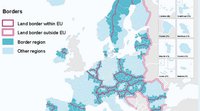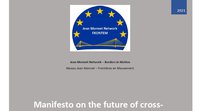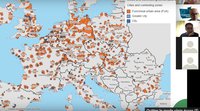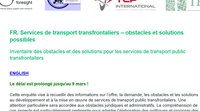EUROPE
New call for proposals for b-solutions 2.0
April 2022A new call for proposals in the framework of the "b-solutions 2.0: Solving Cross-Border Obstacles initiative" has just been launched.

A new call for proposals in the framework of the "b-solutions 2.0: Solving Cross-Border Obstacles initiative" has just been launched.

After a preliminary study carried out in 2020,* the MOT has been commissioned by DG REGIO to conduct another study on the consequences of the pandemic and the impact of the measures taken by countries to combat it in cross-border territories**.

The Franco-German Cross-Border Cooperation Committee met on 12 March in Strasbourg, under the co-chairmanship of Clément Beaune (France), Minister of State for European Affairs, and Anna Lührmann, Minister of State for Europe and Climate (Germany). The MOT officially took part in the meeting as a Committee "expert".

In January 2022, the Summit of Greater Region Executives took stock at the midpoint in France’s presidency, particularly with respect to the industrial, digital and energy transitions, flood and drought risk prevention, food and promoting short supply chains, culture, youth, sport and tourism, healthcare and security.

AEBR and the European Commission’s DG REGIO have released a series of publications aiming at raising awareness of cross-border cooperation. These showcase relevant information gained through the implementation of the b-solutions initiative, which AEBR has managed on behalf of DG REGIO for the past four years.

The 3DS bill (standing for differentiation, decentralisation, deconcentration and simplification of local public action) was adopted in its final reading at the Assemblée Nationale and the Senate in France on 8-9 February. The MOT is delighted about the inclusion for the first time of a chapter devoted to cross-border cooperation in a piece of legislation.
With about 30% of the EU population living in internal border regions, the new DG REGIO publication contributes to the growing recognition of the importance of cross-border public transport services (CBPT) and their role in facilitating cross-border activities central to the development of border regions.

Between June and September 2021, the MOT was commissioned by the Lille Metropolis Development and Urban Planning Agency (ADULM) to conduct an analysis of the consequences of the border restrictions in the territory of the Lille-Kortrijk-Tournai Eurometropolis. The aim was to identify the issues highlighted and revealed by the crisis and the brakes on/levers for the development of the cross-border territory.

On 7 December in Brussels, the French Health Minister, Olivier Véran, and his Spanish counterpart, Carolina Darias, signed a declaration of intent concerning the cross-border hospital in Puigcerdá, which sets out the framework for cooperation with respect to healthcare professionals practising between the two countries.

Lack of accessibility by public transport remains a major obstacle to opening up isolated European border regions. It is on the basis of this observation that the European Commission launched in 2020 a comprehensive study to identify all existing services on European borders.

On the eve of France’s presidency of the EU, the French President, Emmanuel Macron, and the head of the Italian government, Mario Draghi, have signed in Rome a bilateral cooperation treaty, the “Quirinal Treaty”. Sixty years after the signature of the Franco-German Élysée Treaty, this “friendship pact” is historical and marks the desire, at the highest level of state, to advance Franco-Italian cross-border cooperation.

The policy brief "Cross-border monitoring and observation in Europe" explores the main takeaways from research studies done at EU level, compiling the most relevant EU documents, and aims to support the upscaling of good practices for cross-border monitoring and observation to pan-European level.

At the research seminar "The model of the Franco-German border – Reconciliation, cooperation, integration", organised by the Jean Monnet FRONTEM network, a "Manifesto on the future of cross-border cooperation in Europe", addressed to France’s presidency of the EU, and to the Conference on the Future of Europe, was published.

Jean Peyrony, the MOT’s Director-General spoke at two conferences:

This European Commission report, published on 13 July, looks at the lessons of the Covid crisis and the initiatives carried out since the publication of its 2017 Communication “Boosting growth and cohesion in EU border regions”.

Adopted on 1 July, this resolution constitutes an official contribution from the CoR to the Conference on the Future of Europe. It sets out the concrete proposals of the CoR and the European Cross-Border Citizens’ Alliance (AEBR, MOT and CESCI) to put cross-border cooperation back at the top of the EU's policy agenda after a year disrupted by the pandemic.

What have been the different forms of border crisis since the start of 2020? Alongside the joint initiatives to manage the crises, what are the obvious imbalances they have revealed? To answer these questions, the MOT is publishing a summary of one year of reflections by its “Territorial Solidarities” working group.

Organised by the European Committee of the Regions in association with the other founding partners of the European Cross-Border Citizens Alliance (the MOT, AEBR and, CESCI), on 5 July the Conference on the Future of Cross-Border Cooperation brought together nearly 200 participants.

The latest Franco-German Council of Ministers, which met on 31 May 2021 alongside the meeting between Emmanuel Macron and Angela Merkel, took stock of the implementation of the Aachen Treaty and the substantial advances in Franco-German cooperation over the past few months. It was also an opportunity to launch new cooperation initiatives, notably in the areas of healthcare, culture and youth, as well as to prepare for the major upcoming international and European events.

The health crisis put the inhabitants of border regions in an unprecedented position that placed a strain on all aspects of their daily lives. In this case, the daily lives of the inhabitants of the cross-border living area of the Lille-Kortrijk-Tournai Eurometropolis were seriously disrupted. The concrete effects of these restrictions need to be analysed in greater depth to learn the lessons in order to act better in the future.

Since 2018, the advances in Franco-German relations are major: the signing of the Aachen Treaty, the creation of the Franco-German Committee on Cross-border Cooperation (CCT) and the Franco-German Parliamentary Assembly. These democratic innovations, a first in Europe, are enabling us to identify territorial dissonances and to take action to harmonise our national legal frameworks.

Feedback on the MOT Network’s Working Groups: Since 2020, the working groups of the MOT network have been bringing together MOT members at regular intervals to share the experiences of border areas and encourage the emergence of propositions for action. Here we present the findings of the first three groups established.

This new observatory (French level) presented its preliminary findings at a webinar on 19 March, entitled “What is the impact of the Covid-19 crisis on territories’ economic and social dynamics?”, in which the MOT participated.

On 16 March 2021, French Parliament definitively adopted the draft legislation aimed at simplifying and developing local experimentation initiated by territorial authorities.

The DG REGIO has launched a study to identify all existing cross-border public transport services and related legal obstacles. The contributions to this survey are crucial to ascertain the number of existing services and to gather information on the challenges that need to be overcome.